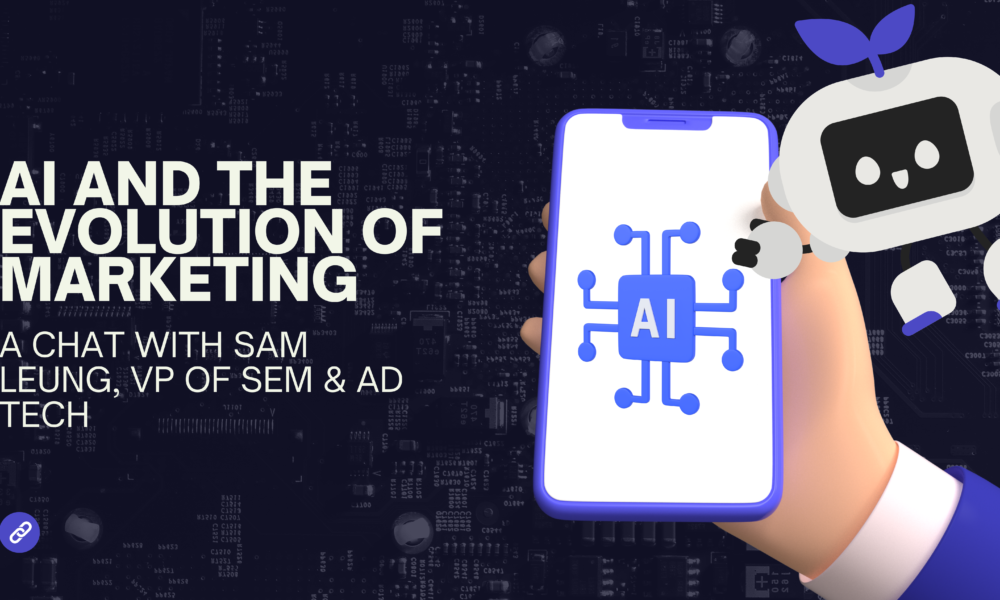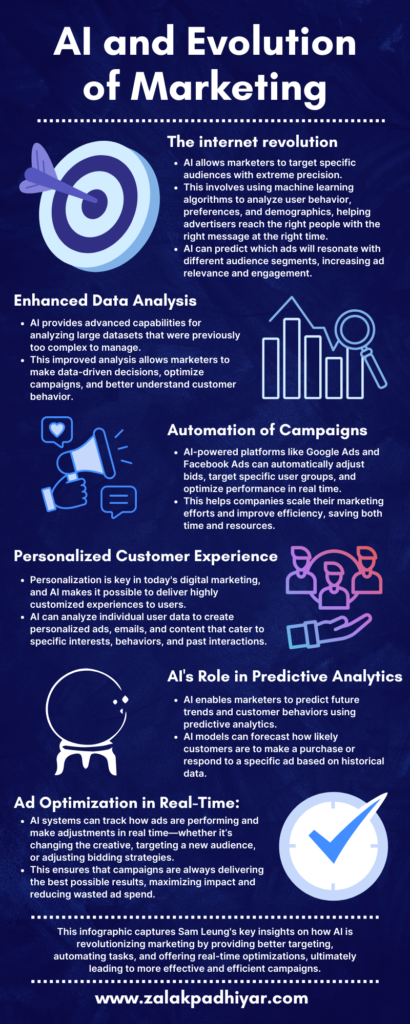While pursuing my Post graduation certificate for Digital Media Marketing program, I have been grateful to connect with seniors in marketing industry that have provided us some helpful knowledge and tips to stand out while looking for our workplace. For me particularly, I struggle figuring out which industry is best for me and if it is worth investing my energy in. I am sure that I like SEM coordinator job roles, but I have been worried about growing industry trend towards AI technology and have heard a lot from my peers on how they felt about it, and I also have my own opinion towards it. Hence, it was great hearing from Sam, VP of Search Engine Marketing (SEM/SEO) and Advertising Technology, at The Aber Group to provide his insights and help me clear my doubts. In a recent Zoom call for our class, Sam Leung delved into how marketers can effectively use AI while emphasizing the need to do so responsibly. Through his valuable insights, Sam gave us a glimpse into the future of marketing with AI, outlining both its opportunities and challenges.
Reflecting on the Benefits and Tips Shared by Sam:
One of the main points Sam outlined during the call was how AI has become ubiquitous in the marketing world, helping marketers work more efficiently by streamlining tasks like data analysis, ad personalization, and creative production. AI allows marketers to automate processes such as creating large Excel reports or tailoring ads to specific audiences. However, Sam cautioned that while AI can provide significant shortcuts, it is not a magic solution—it requires a combination of AI’s capabilities and human insight to create impactful results.
He also highlighted large language models like ChatGPT and Google’s Gemini, which help generate copy for blogs, emails, and ads quickly. However, Sam reminded us that these tools should assist creativity, not replace it. Marketers should remain at the helm, using AI to accelerate their efforts while refining the final output through their own expertise.
What Challenges Lie Ahead for Marketers Who Use AI?
While the benefits of AI in marketing are clear, Sam also touched on some challenges that marketers will face as AI continues to evolve. One pressing issue is the increasing importance of privacy in AI-driven marketing strategies. As privacy laws tighten and data access becomes restricted, marketers will need to rely more on non-personally identifiable information (non-PII) to target customers. This shift demands a more thoughtful, ethical approach to data usage, ensuring that AI’s potential is used responsibly without overstepping privacy boundaries.
Additionally, as AI’s predictive models continue to improve, marketers must ensure they do not become overly reliant on these tools at the cost of human intuition and creativity. It will be crucial for marketers to maintain a balance between AI-driven data insights and their own strategic thinking.
Reflecting on the Case Study and Top 3 Hurdles in Integrating AI:
During our class, we worked on a case study that explored how AI could be integrated into marketing workflows. Reflecting on that exercise, three key hurdles stood out when considering the practical application of AI in the workplace:
- Data Privacy and Ethics: With AI systems processing vast amounts of data, ensuring compliance with privacy laws (like GDPR or CASL) will be a major challenge. To overcome this, companies must establish strict guidelines and regularly audit their AI systems to ensure ethical data usage.
- Adapting to New Skill Sets: Integrating AI into marketing means that teams will need to acquire new skills, particularly in data science and AI management. Upskilling the workforce through AI training and fostering a tech-savvy environment can help overcome this hurdle.
- Balancing Automation and Creativity: AI can automate tasks, but creativity still requires human input. A challenge will be maintaining a healthy balance between efficiency and innovation. Marketers must use AI to enhance creativity rather than replace it. Regular brainstorming sessions, human-led campaign ideation, and strategic oversight can help maintain this balance.
Career Prospects Related to AI and Machine Learning:
As someone aspiring to enter the digital marketing field, Sam’s insights left me reflecting on how AI and machine learning will shape my career prospects. AI offers a wealth of opportunities to streamline processes and deliver targeted marketing at scale. However, staying competitive will require continuously learning how to leverage these tools while also honing creative critical thinking skills that AI cannot replicate.
The marketing landscape is rapidly evolving, and having a firm grasp of AI will be key to succeeding in this dynamic industry. I look forward to embracing the integration of AI into my future career, focusing on how to use it responsibly to drive innovative and effective marketing strategies.
Sam Leung’s presentation offered a valuable glimpse into the future of marketing with AI. While AI holds immense promise for marketers, the road ahead is not without its challenges. By focusing on responsible AI use, balancing automation with creativity, and adapting to the evolving data privacy landscape, marketers can ensure that AI remains a tool for empowerment rather than a crutch. Reflecting on these insights, I am excited to see how AI will continue to shape my own career as I prepare to navigate the future of marketing.



